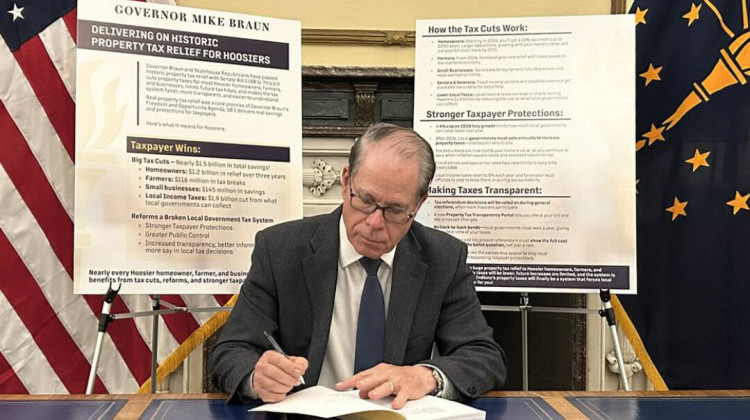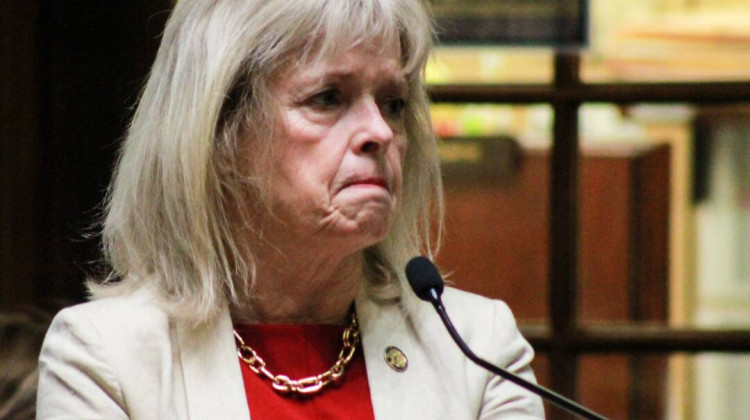
Senate President Pro Tem Roderic Bray says water legislation will be part of the conversation during the upcoming session
FILE PHOTO: WBAA NEWS/Ben ThorpWest Lafayette lawmakers said they are optimistic about the possibility of passing water legislation during the state’s upcoming legislative session.
That’s despite Statehouse leadership setting tempered expectations for the 2024 session.
Leaders in the House and Senate said they – like local officials – are waiting for more data before moving forward on a proposed pipeline moving water from Tippecanoe County to Lebanon.
Senate President Pro Tem Rodric Bray said he is unsure about what water legislation might pass.
“You may see legislation this year on that issue,” he said. “Whether or not it moves or not is depending on what it says and we’ll have that conversation.”
But Bray did stress that large water withdrawal projects -- like a proposed pipeline that would take millions of gallons per day from Tippecanoe County to Lebanon – should not move forward until the impacts are well understood.
“The LEAP project is a fantastic project that promises to be really positive for Indiana, in fact potentially transformational for Indiana. We haven’t spent as much time on water as some other states, particularly in the Southwest, because we have had a lot of water,” Bray said. “...But we’re not going to take any other steps until we have an opportunity to study, to make sure there is ample water for the projects we’re trying to bring into the state of Indiana, and that we understand just how much is too much to take away from any particular community.”
Earlier this week, Tippecanoe County officials moved to block major water withdrawals for nine months – hoping that lawmakers would take action on the issue during the next session.
The move is part of the growing opposition in the region to proposed withdrawals.
Sen. Spencer Deery (R-West Lafayette) said he’s received two commitments from legislative leadership – including their openness to bills that put “guardrails” in place around water withdrawals.
“This is not to say that we are going to pass it, or that we’re going to get everything we want,” Deery said. “...But it does say this isn’t dead upon arrival, and there is work we can continue to do as we work with stakeholders to get the best bill we feel like we can pass.”
Deery said leadership also guaranteed that the proposed pipeline – which would require the financial backing of the General Assembly – will not move forward in the upcoming session.
“For those that were fearful this was going to be done immediately in the middle of the night, that’s not going to happen in the next couple of months,” he said.
The state is moving forward with three separate studies looking into water availability for projects like the pipeline.
Last week, Gov. Eric Holcomb announced the Indiana Finance Authority would oversee an ongoing water supply study in Tippecanoe County. The move included an additional, more comprehensive water supply study for the region and new water monitoring devices.
The Indiana Chamber of Commerce will also oversee its own water study – this one looking at water availability for the entire state.
Greg Ellis is the Vice President of Energy, Environment, Federal Affairs, and General Counsel with the Chamber. He said they will update a 2014 study looking at how available water resources can be used to plan for economic growth.
“Probably some of the studies that are being done area-specific will have more detailed information for those specific areas,” Ellis said. “But we’re going to take into account that information and incorporate it into our study as well.”
Ellis said he’s ultimately glad that water issues have become a focus for the state.
“We need to manage and plan and protect the resource for the business community - but not just the business community - for the citizens of Indiana to prosper,” he said. “Part of the good thing of some of this I would say, bad publicity, is that it’s drawing attention, people are paying attention to this.”
The results of an initial study from the Indiana Finance Authority are expected in January 2024, with the more comprehensive water study ordered by Holcomb expected sometime in the fall.
The Chamber of Commerce study is expected to be completed by the summer of 2024.
9(MDAyMzk1MzA4MDE2MjY3OTY1MjM5ZDJjYQ000))
 DONATE
DONATE






 Support WFYI. We can't do it without you.
Support WFYI. We can't do it without you.